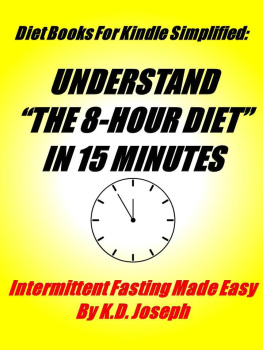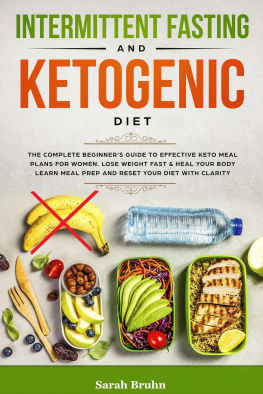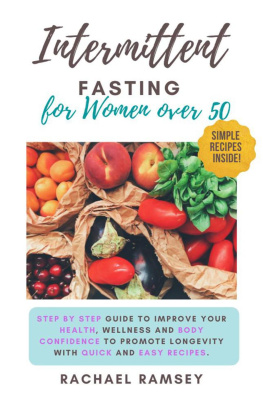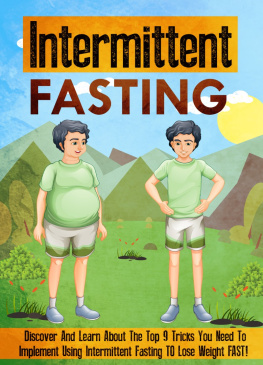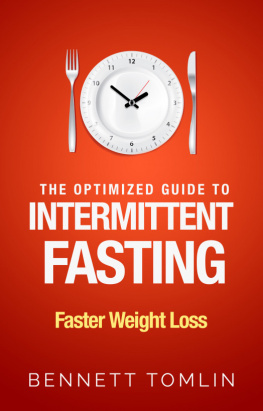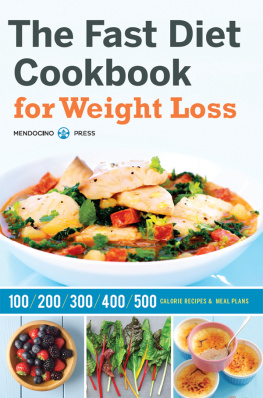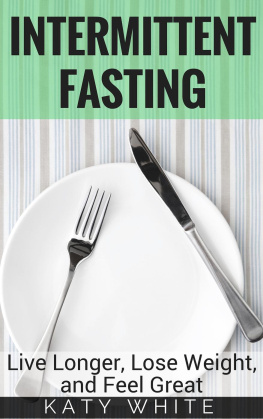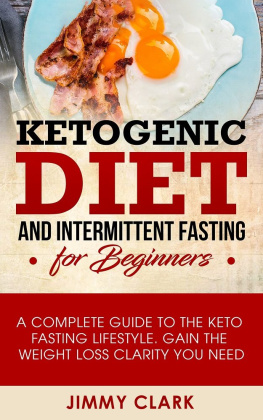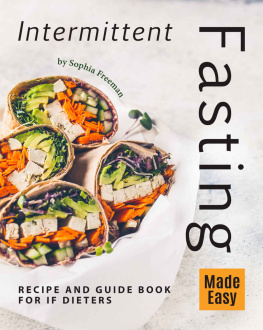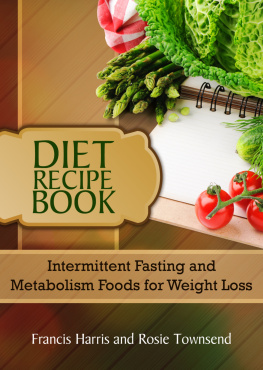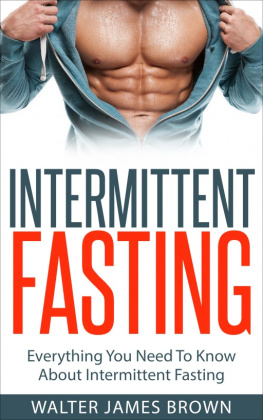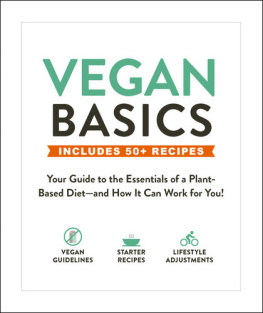Diet Books For Kindle Simplified:
Understand The 8-Hour Diet In 15 Minutes
(Intermittent Fasting Made Easy)
By K.D. Joseph
Copyright 2013 by K.D. Joseph. All rightsreserved.
The ideas, concepts, and opinionsexpressed in this book are intended to be used for educational purposesonly. This book is made available with the understanding that the authorand publisher are not presenting any specific medical advice. Nothing inthis book is intended to replace medical advice, or diagnose any specificphysical problem. Every person is different, and this book cannottake these individual differences into account. It is important toconsult with a licensed physician or other competent medical professional. The author and publisher claim noresponsibility to any person or entity for any liability, loss, or damagecaused or alleged to be caused directly or indirectly as a result of the use,application, or interpretation of the material in this book. For more information or to contact the authorclick this link: http://bit.ly/WCUHD2
-----------------
Let me tell you what you already know: There is a vastamount of books on Kindle about dieting and weight loss. And even though it is a small fish in a bigpond, there are already numerous books on Intermittent Fasting (called IFfor short.) Its very easy to become overwhelmed with somuch material out there.
The irony is Intermittent Fasting is not confusing. It is a subject you should never feeloverwhelmed about. And IntermittentFasting has one huge advantage compared to most other forms of dieting: Itreally is easy. That makes it worthknowing about.
I originally found out about Intermittent Fasting a fewyears ago from a website run by Martin Berkhan called Leangains. Martin probably has more to do with IFsincreased popularity than anybody else. Hiswebsite is free and it is a phenomenal resource for people looking to go indepth with their research of IF and the science behind it. Here is a link to Martins popular site: http://bit.ly/bbdxZD
As much as I like Martins site, unless you are intobodybuilding I doubt you will find it very interesting. You see, most of us only care aboutfinding out how to lazily and safely lose weight. 95% of us could care less about the sciencebehind it.
Unless you have a background in nutrition and science, it isgoing to be very hard to understand many of the claims and concepts that areexpounded upon in IF books. Most of uscould care less we just want a dietary model that is safe and allows us tolose unwanted weight.
You do not need to spend money and many hours reading books,like the bestselling The 8-Hour Diet by David Zinczenko and Peter Moore, toimplement Intermittent Fasting in your life. You only have to buy a big IF book like that if you want to go intoextreme depth on the topic and understand that the free Leangains site is probablya better resource than any IF book you buy online.
I think an excess of information on this inherently easydietary method will unfortunately confuse many readers, and make many peopleresist ever trying Intermittent Fasting. So Im writing this brief guide to show you precisely how easy IF is forthe normal person - and so you dont have to slog through a 300 page book thatmay make IF seem more complicated than it actually is.
Intermittent Fasting, for the vast majority of people wholazily and safely want lose weight, simply entails skipping breakfast.
Thats it. Thissimple advice, which is diametrically opposed to standard American dietaryrecommendations, can significantly improve your health.
I personally have tried many dietary options in my life(vegetarian, raw food, low carb, protein cycling - to name just a few) and IntermittentFasting is by far the most easy diet to implement and stay on that I have evercome across. The reasons for that arepretty self-explainable.
Many diets claim to be simple, but end up being hard. Whatis brilliant about IF is it backs up all its claims of being easy. All you needto do is skip breakfast. IF ismanageable to start and sustain, because it is so blatantly simple to follow.
Especially if you are a lazy dieter, and just want to learnthe basic trick of IF, all you need to know is this: You naturally consume fewercalories over the course of the day by not eating anything in the morning, andinevitably you lose weight because of that dietary habit.
Morning caloric restriction intuitively makes sense as aconcept for weight loss, and it works.
Just try it. Startskipping breakfast and dont eat until around lunchtime. You can drink tea or black coffee in themorning, but dont consume any calories until around noon.
Naturally, to actualize IF more effectively, it helps tolimit your eating window to a smaller period of time (like eating only from 1pmto 7pm every day) and to eat good food, but doing these tasks consistentlyoften proves too burdensome for many people.
Just skip breakfast. Thats enough to get you started with IF, and for you to see real weightloss occur. This weight loss will oftenbe substantial and pleasantly surprising, no matter what you eat for lunch anddinner.
So relax, and do this:
Skip Breakfast.
It all comes back to that. Of course, IF can be described much more elaborately, but for almost allof us it just comes down to simply skipping breakfast and not snacking lateinto the night.
You do not want to make Intermittent Fastingcomplicated. You want to just do it. Do not obsess over details; just startskipping breakfast. This first step isthe most important step by far.
Lets spend a moment talking about skipping breakfast.
This is what you need to know: It is not hard to skipbreakfast.
Dont worry, you will not starve if you dont have yourbagel in the morning.
People eat much more often than they need to. You do not need to be eating every few hours especially if you are eating nutritious foods and not pure crap. There is no need to eat more than two orthree times a day, and there is absolutely no need to eat in the morning.
Do not be concerned about not having energy because youdid not eat in the morning. Any initialfeelings of fatigue you experience when you start IF will go away after a fewdays, and are mainly a small mental hurdle you need to overcome. Ive been doing IF long enough to know such afeeling is purely psychological. Have afilling meal the night before, and dont worry about eating until the followingday at lunch. After a few days ofpractice, this eating arrangement will seem normal. There is no problem feeling a little hungryfor lunch. Feeling a little bit ofhunger is good it means you are losing weight.
Often many of us are not hungry when we wake up, but we areaccustomed to having breakfast because we are "supposed to." Its time to break this habit. You can still drink liquid - like water,black coffee, or tea - but have no calories. Like I said, for the first couple of days this might be difficult, butgently battle through it. Its not hard. Relax and understand that soon you will beused to not eating in the morning, and it will actually be pleasurable to neverworry about what you need to eat for breakfast.
If you can hold off eating until lunch, and presuming youhave not eaten since dinner the night before, then each day you are giving yourbody a long window in which you are not consuming any calories. This is incredibly advantageous to weightloss, as well as to your general health.
When we sit down and eat we should have as much food as wewant. We should not watch ourcalories. We should eat until we feelfully satiated. But I do not recommend eatingevery few hours, or to be snacking all the time.
Try having only two or three meals a day, and cut out the patternof eating all the time. Do notincessantly be nibbling on something. Atnoon you can have a big lunch. If youget hungry in the mid-afternoon, you can have a snack. And you can have a big dinner at night. That will be plenty of food; you will befull.
Next page
